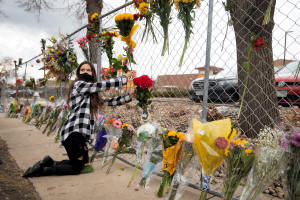In Colorado, trauma from mass shootings lingers for generations
 Send a link to a friend
Send a link to a friend
 [March 24, 2021]
By Keith Coffman and Sharon Bernstein [March 24, 2021]
By Keith Coffman and Sharon Bernstein
BOULDER (Reuters) - An 80-year old man, a
pair of soldiers in military garb and a 20-year-old student were among
the stream of people braving cold mountain winds to lay flowers at one
of the makeshift memorials for 10 victims of Colorado's latest mass
shooting.
There have been so many shootings in this Western state in the 21 years
since two students massacred 13 people before killing themselves at
Columbine High School in Littleton that generations of residents have
seen similar memorials erected for the dead.
“We have to re-evaluate our morals and values," said Mike Tucker, 80, a
retired marketing executive. "We seem to have lost the ability to
distinguish those.”
His voice cracked and he blinked back tears as he lay a bouquet at
Boulder Police headquarters in honor of Eric Talley, a policeman killed
along with nine others in Monday's massacre.

Another memorial sprang up at the site of the shooting - a King Soopers
grocery store - where people people wept silently as they placed flowers
and votive candles along a 100-yard stretch of chain-link fencing set up
to contain the crime scene.
One placed a sign that said, "Pray for Boulder." Nearby, a man softly
played the cello. FBI investigators swarmed around a black SUV in the
parking lot.
Police on Tuesday identified 21-year-old Ahmad Al Aliwi Alissa of
Arvada, Colorado as the suspect accused of killing shoppers and workers
in a hail of bullets at the supermarket, marking the United States'
second mass shooting in a week and adding to the state's tragic history
of deadly massacres. [L1N2LL1YY]
"We all share Boulder’s pain – pain that hits home," John Hickenlooper,
the state's former governor, now a U.S. senator wrote on Twitter on
Tuesday, tolling the names of schools and locations where mass shootings
occurred: "Columbine, Arapahoe, Platte Canyon, STEM School Highlands
Ranch, Planned Parenthood, Aurora – and now Boulder."
The litany of places where Colorado's shooting attacks have occurred
over the last two decades resonates deeply and personally for many
residents. Columbine, the suburban high school, remains one of the worst
school shootings in U.S. history. In Aurora, a gunman killed 12 people
and wounded 50 at a screening of the Batman movie "The Dark Knight
Rises" in 2012. And this week, Boulder.
Littleton resident Jane Dougherty's children experienced their first
lockdowns in elementary and middle school at campuses next to Columbine.
Now her granddaughters hide in kindergarten lockdowns. In 2012,
Dougherty's sister, Mary Sherlach, was murdered in the mass shooting at
Sandy Hook Elementary School in Connecticut.
[to top of second column]
|

Morgan Beltzer, 14, of Broomfield, leaves flowers at the site of a
mass shooting at King Soopers grocery store in Boulder, Colorado,
U.S. March 23, 2021. REUTERS/Alyson McClaran/File Photo

“People don’t understand how many of us have been affected multiple
times by gun violence," said Sandy Phillips, whose daughter, Jessica
Ghawi, was murdered at "The Dark Knight Rises" showing. "I always
say you’re one bullet away."
One of her daughter's college professors - a woman who helped her
students process their grief after Jessica's death - lost her own
husband in the Boulder shooting, said Phillips, now an advocate for
survivors of gun violence.
Another factor is copycat actors, said Dave Cullen, who has written
books on mass shootings at Columbine and Marjory Stoneman High
School in Florida.
"Having it happen in your community and over and over, it’s just
really real and plausible for you to try it too if you’re so
inclined," he said.
The epidemic of mass shootings and the trauma left in their wake are
certainly not limited to Colorado.
"I don't think we're ahead of anybody else - it's a national
problem," said Marilyn Whittaker, a retired school psychologist who
lay flowers at the makeshift memorial at the Boulder police
headquarters.

But in Colorado, where violence has occurred again and again, the
trauma is palpable.
Dougherty looks around for an exit every time she's in a crowded
public space. Her daughter is afraid to take her new baby out in
public.
"We’re all a bit traumatized by living in a culture where this is
going on - by living in a society that has this level of violence,"
said Beverly Kingston, director of the Center for the Study and
Prevention of Violence at the University of Colorado Boulder.
(Writing by Sharon Bernstein; editing by Paul Thomasch and Cynthia
Osterman)
[© 2021 Thomson Reuters. All rights
reserved.] Copyright 2021 Reuters. All rights reserved. This material may not be published,
broadcast, rewritten or redistributed.
Thompson Reuters is solely responsible for this content. |